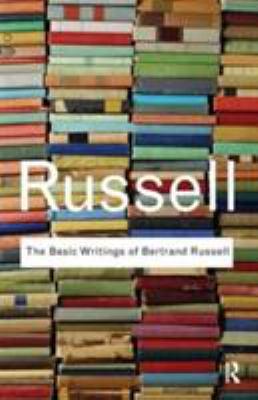
The basic writings of Bertrand Russell
Few philosophers have had a more profound influence on the course of modern philosophy than Bertrand Russell. The Basic Writings of Bertrand Russell is a comprehensive anthology of Russell's most definitive essays written between 1903 and 1959. First published in 1961, this remarkable collection is a testament to a philosopher whom many consider to be one of the most influential thinkers of the twentieth century. This is an essential introduction to the brilliance of Bertrand Russell.
Available Copies by Location
| Location | |
|---|---|
| Community Centre | On holds shelf |
Browse Related Items
| Subject |
| Philosophy. Philosophy, British > 20th century. |
- ISBN: 0415472385
- ISBN: 9780415472388
-
Physical Description
print
xxxii, 749 pages --. - Publisher London : Routledge, 2009.
Content descriptions
| General Note: | Originally published as: The basic writings of Bertrand Russell, 1903-1959. London: George Allen & Unwin, 1961. |
| Bibliography, etc. Note: | Includes bibliographical references and index. |
| Formatted Contents Note: | Autobiographical asides -- My religious reminiscences -- My mental development -- Adaptation: an autobiographical epitome -- Why I took to philosophy -- The Nobel Prize winning man of letters (essayist and short story writer) -- How I write -- A free man's worship -- An outline of intellectual rubbish: a hilarious catalogue of organized and individual stupidity -- The metaphysician's nightmare -- The philosopher of language -- Language -- Sentences, syntax, and parts of speech -- The uses of language -- The cult of "common usage" -- The logician and philosopher of mathematics -- Symbolic logic -- On induction -- Preface to Principia mathematica -- Introduction to Principia mathematica -- Summary of part III, Principia mathematica -- Summary of part IV, Principia mathematica -- Summary of part V, Principia mathematica -- Summary of part VI, Principia mathematica -- Introduction to the second edition, Principia mathematica -- Mathematics and logic -- The validity of inference -- Dewey's new logic -- John Dewey -- The epistemologist -- Knowledge by acquaintance and knowledge -- By description -- Theory of knowledge -- Epistemological premisses -- The metaphysician -- Materialism, past and present -- Language and metaphysics -- The retreat from Pythagoras -- Historian of philosophy -- Philosophy in the twentieth century -- Aristotle's logic -- St Thomas Aquinas -- Currents of thought in the nineteenth century -- The philosophy of logical analysis -- The psychologist -- Psychological and physical causal laws -- Truth and falsehood -- Knowledge behaviouristically considered -- The moral philosopher -- Styles in ethics -- The place of sex among human values -- Individual and social ethics -- "What I believe" -- The expanding mental universe -- The philosopher of education -- Education -- The aims of education -- Emotion and discipline -- The functions of a teacher -- The philosopher of politics -- The reconciliation of individuality and citizenship -- Philosophy and politics -- Politically important desires -- Why I am not a communist -- The philosopher in the field of economics -- Property -- Dialectical materialism -- The theory of surplus value -- The philosopher of history -- On history -- The materialistic theory of history -- History as an art -- The philosopher of culture: East and West -- Chinese and Western civilization contrasted -- Eastern and Western ideals of happiness -- The philosopher of religion -- The essence of religion -- What is an agnostic? -- Why I am not a Christian -- Can religion cure our troubles? -- The philosopher and expositor of science -- Physics and neutral monism -- Science and education -- Limitations of scientific method -- The new physics and relativity -- Science and values -- Non-demonstrative inference -- The analyst of international affairs -- The taming of power -- If we are to survive this dark time -- What would help mankind most? -- Current perplexities -- World government -- The next half-century -- Life without fear -- Science and human life -- Open letter to Eisenhower and Khrushchev -- Man's peril -- Methods of settling disputes in the nuclear age. |
| Immediate Source of Acquisition Note: | LSC 60.30 |

